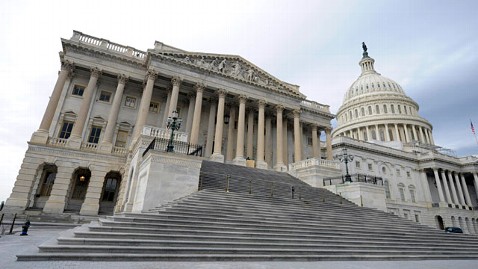'Big Government' Payrolls Get Smaller as Private Sector Grows

Susan Walsh/AP Photo
The "big government" that Tea Partiers demonize and GOP candidates rile against is getting smaller.
A Gallup poll released Monday showed that the government is sloughing off jobs at every level, with local, state and federal governments shedding about 1 percent of their combined work force last year.
While government employment decreased in 18 of the past 24 months, private sector employment grew in 23 out of those 24 months.
The 280,000 public sector jobs cut at all levels of government in 2011 were only a starting point for the cuts some GOP candidates hope to make to federal payrolls.
"The American people are increasingly working to support the government," Mitt Romney said after he unveiled his budget-cutting plan in November. "It ought to be the other way around."
Both Ron Paul and Mitt Romney want to shrink the federal work force by 10 percent, or by cutting an additional 284,000 jobs. Under Romney's plan, one federal employee would be hired for every two that retire, while Paul plans to eliminate five federal departments: Interior (70,000 employees), Commerce (56,800 employees), Energy (16,000 employees), Education (4,400 employees) and Housing and Urban Development (9,500 employees).
"I am absolutely convinced this is the only way to prosperity," Paul said in October after he announced his economic plan. "If we want jobs, we have to get the government out of our way."
Cutting the federal work force, freezing federal pay and scaling back federal employee benefits have appealed to congressional budget-cutters too.
In the Senate last week, Sens. Jon Kyl and John McCain of Arizona proposed eliminating 5 percent of the federal work force, or about 100,000 jobs, to prevent the automatic defense spending cuts due to kick in next year.
The Kyl- McCain plan also calls for an additional year-long federal pay freeze, which if passed would be the third year in a row that federal employees saw their pay remain stagnant.
"Shrinking the federal government deficit by laying people off, that may be the right thing in long run, but it is having a contractionary effect on the labor market," said Linda Barrington, managing director of the Institute for Compensation Studies at Cornell University. "In the short run, we need to acknowledge that it may be pushing the number in the wrong direction."
Most Americans support this approach to deficit reduction. About 65 percent of the population believes "big government" is the greatest threat to the country, a near record high, according to a December Gallup poll. About 26 percent said big business and 8 percent said big labor were the greatest threat.